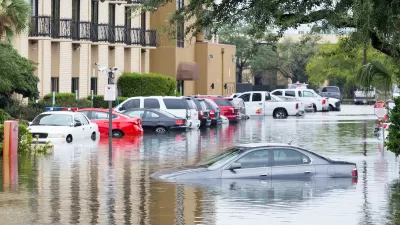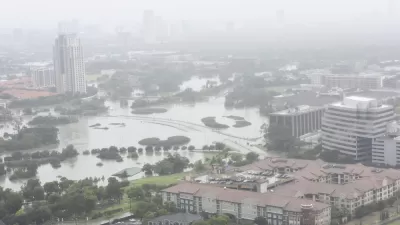Critics contend that New York's so-called resilience strategy doesn't go far enough in protecting the city's 520-mile-long coast and low-lying areas from the threats of rising seas and ever-more-severe storm flooding, reports Mireya Navarro.
While New York has engaged in some of the country's most aggressive efforts to understand, and help fend off, the effects of climate change, "critics say New York is moving too slowly to address the potential for
flooding that could paralyze transportation, cripple the low-lying
financial district and temporarily drive hundreds of thousands of people
from their homes."
Although the city is undertaking efforts to expand wetlands, install green roofs, and get property owners to move boilers to higher floors, critics such as Douglas Hill, an engineer with the Storm Surge Research Group at Stony Brook University, on Long Island, are concerned that, "They lack a sense of urgency about this."
"Instead of 'planning to be flooded,' as he put it, city, state and
federal agencies should be investing in protection like sea gates that
could close during a storm and block a surge from Long Island Sound and
the Atlantic Ocean into the East River and New York Harbor."
"Officials in New York caution that adapting a city of eight million
people to climate change is infinitely more complicated and that the
costs must be weighed against the relative risks of flooding," notes Navarro.
"'It's a million small changes that need to happen,' said Adam Freed,
until August the deputy director of the city's Office of Long-Term
Planning and Sustainability. 'Everything you do has to be a calculation
of the risks and benefits and costs you face.'"
"And in any case, Mr. Freed said, 'you can't make a climate-proof city.'"
FULL STORY: New York Is Lagging as Seas and Risks Rise, Critics Warn

Maui's Vacation Rental Debate Turns Ugly
Verbal attacks, misinformation campaigns and fistfights plague a high-stakes debate to convert thousands of vacation rentals into long-term housing.

Planetizen Federal Action Tracker
A weekly monitor of how Trump’s orders and actions are impacting planners and planning in America.

In Urban Planning, AI Prompting Could be the New Design Thinking
Creativity has long been key to great urban design. What if we see AI as our new creative partner?

Massachusetts Budget Helps Close MBTA Budget Gap
The budget signed by Gov. Maura Healey includes $470 million in MBTA funding for the next fiscal year.

Milwaukee Launches Vision Zero Plan
Seven years after the city signed its Complete Streets Policy, the city is doubling down on its efforts to eliminate traffic deaths.

Portland Raises Parking Fees to Pay for Street Maintenance
The city is struggling to bridge a massive budget gap at the Bureau of Transportation, which largely depleted its reserves during the Civd-19 pandemic.
Urban Design for Planners 1: Software Tools
This six-course series explores essential urban design concepts using open source software and equips planners with the tools they need to participate fully in the urban design process.
Planning for Universal Design
Learn the tools for implementing Universal Design in planning regulations.
Gallatin County Department of Planning & Community Development
Heyer Gruel & Associates PA
JM Goldson LLC
City of Camden Redevelopment Agency
City of Astoria
Transportation Research & Education Center (TREC) at Portland State University
Jefferson Parish Government
Camden Redevelopment Agency
City of Claremont





























